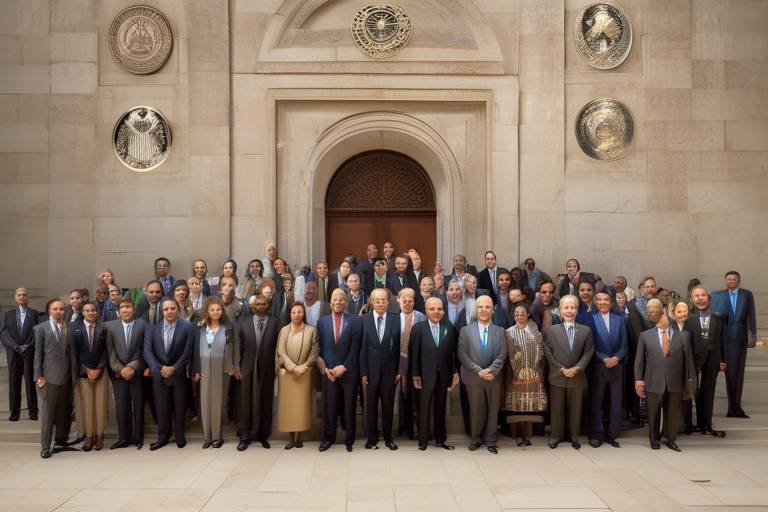The Legacy of the Pythagorean Brotherhood
The Pythagorean Brotherhood, founded by the legendary Pythagoras, stands as a beacon of ancient wisdom that continues to illuminate the realms of mathematics, philosophy, and spirituality. This mystical and philosophical group, shrouded in mystery and symbolism, has left an indelible mark on the tapestry of human knowledge and understanding.
Originating in the rich intellectual landscape of ancient Greece, the Pythagorean Brotherhood was a sanctuary for seekers of truth and enlightenment. Rooted in the profound teachings of Pythagoras, the brotherhood espoused principles of harmony, balance, and the interconnectedness of all things.
One of the most enduring legacies of the Pythagorean Brotherhood lies in its mathematical contributions. The discovery of the Pythagorean theorem, a fundamental principle in geometry, revolutionized the field of mathematics and laid the groundwork for further advancements in number theory and geometric principles.
Delving into the philosophical teachings of the brotherhood reveals a deep well of wisdom and ethical principles. Central to their beliefs was the notion of the pursuit of wisdom as a lifelong journey, guided by moral conduct, introspection, and a reverence for the inherent order of the universe.
Within the confines of the Pythagorean Brotherhood, spiritual practices played a crucial role in the pursuit of enlightenment. Members engaged in contemplation, purification rites, and the study of esoteric knowledge, seeking to transcend the material world and attain a higher state of consciousness.
The influence of the Pythagorean Brotherhood on Western thought cannot be overstated. Their ideas permeated the fabric of intellectual discourse, shaping the development of philosophy, mathematics, and metaphysical concepts that continue to resonate in contemporary society.
Today, the legacy of the Pythagorean Brotherhood endures, weaving its way through the fabric of modern society. Their teachings continue to inspire individuals in various fields, from science and art to spirituality, serving as a timeless reminder of the enduring power of ancient wisdom.
As we unravel the mysteries and symbolic representations associated with the Pythagorean Brotherhood, we gain insight into the deeper meanings behind their teachings and practices. The enigmatic nature of their beliefs invites us to contemplate the interconnectedness of the universe and the eternal quest for knowledge and enlightenment.
In a world marked by rapid change and technological advancement, the principles and teachings of the Pythagorean Brotherhood hold a mirror to our own quest for meaning and understanding. Their timeless wisdom serves as a guiding light in navigating the complexities of the modern world, reminding us of the eternal truths that transcend time and space.

Origins of the Pythagorean Brotherhood
The Pythagorean Brotherhood, one of the most renowned mystical and philosophical groups in ancient history, traces its origins back to the teachings of the legendary Pythagoras. Born in the 6th century BC on the island of Samos, Pythagoras was a multifaceted figure, revered for his mathematical prowess, philosophical insights, and spiritual wisdom. His intellectual curiosity and quest for knowledge led to the establishment of the Pythagorean Brotherhood, a community dedicated to exploring the mysteries of the universe and the principles governing existence.
Pythagoras' teachings emphasized the interconnectedness of mathematics, philosophy, and spirituality, laying the foundation for the diverse pursuits of the Brotherhood. As a prominent figure in ancient Greek society, Pythagoras attracted followers who shared his passion for seeking truth and understanding the underlying order of the cosmos. The Brotherhood, therefore, emerged as a collective endeavor to unravel the mysteries of the universe and cultivate wisdom through intellectual inquiry and spiritual contemplation.
Central to the origins of the Pythagorean Brotherhood was the notion of harmonia, or harmony, which permeated all aspects of their teachings. The concept of harmonia reflected the belief in the inherent unity and balance of the universe, with numbers and proportions serving as fundamental elements of this cosmic harmony. Through the study of mathematics, the Brotherhood sought to uncover the underlying principles that governed the natural world, viewing numbers as the key to unlocking the mysteries of existence.
Furthermore, the Pythagorean Brotherhood upheld a set of ethical principles that guided their philosophical pursuits and interpersonal relationships. The emphasis on moral conduct, self-discipline, and the pursuit of virtue characterized the Brotherhood's approach to life, reflecting Pythagoras' belief in the importance of cultivating both intellectual and moral excellence. By adhering to these ethical precepts, members of the Brotherhood aspired to lead lives of integrity and wisdom, embodying the ideals espoused by their revered founder.

Mathematical Contributions
When it comes to mathematical contributions, the Pythagorean Brotherhood stands out as a beacon of innovation and discovery in the ancient world. At the core of their mathematical achievements lies the renowned Pythagorean theorem, a fundamental principle in geometry that establishes the relationship between the sides of a right triangle. This theorem, attributed to Pythagoras himself, has had a profound impact on the field of mathematics and continues to be a fundamental concept taught in schools worldwide.
In addition to the Pythagorean theorem, the Brotherhood made significant advancements in geometry, exploring the properties of shapes and figures with a keen eye for detail and precision. Their geometric discoveries laid the foundation for future mathematical developments and provided a framework for understanding spatial relationships and measurements.
Furthermore, the Pythagoreans delved deep into the realm of number theory, uncovering hidden patterns and relationships within the world of numbers. Their fascination with the mystical qualities of numbers led to the development of numerology and the belief in the inherent significance of numerical sequences. By exploring the properties of numbers, the Pythagorean Brotherhood expanded the boundaries of mathematical knowledge and inspired generations of mathematicians to come.

Philosophical Teachings
The Pythagorean Brotherhood, beyond its mathematical prowess, was deeply rooted in philosophical teachings that shaped the worldview of its members. At the core of their beliefs was the concept of harmony, not only in the realm of numbers but also in the broader context of the universe. They saw the world as an interconnected web of relationships, where everything had its rightful place and function, echoing the harmony found in musical compositions.
Furthermore, the Brotherhood emphasized the pursuit of wisdom as a lifelong journey, viewing knowledge as a guiding light that illuminates the path to understanding the mysteries of existence. For them, wisdom was not merely the accumulation of facts but the ability to discern the underlying truths that govern the cosmos.
Central to their philosophical teachings was the importance of ethical conduct and moral virtue. The Pythagoreans believed in the power of self-discipline and self-reflection to cultivate a harmonious inner self, leading to a harmonious society. They upheld values such as integrity, moderation, and justice as essential virtues that guided their actions and interactions with others.
Moreover, the Brotherhood encouraged introspection and contemplation as means to delve into the depths of one's soul and connect with the universal truths that underlie existence. Through meditation and philosophical inquiry, they sought to attain a deeper understanding of the self and the cosmos, transcending the boundaries of the material world.
In essence, the Pythagorean Brotherhood's philosophical teachings were not just intellectual exercises but practical guidelines for living a harmonious and virtuous life. Their emphasis on the interconnectedness of all things, the pursuit of wisdom, and the cultivation of ethical conduct continues to inspire seekers of truth and wisdom in the modern world.

Spiritual Practices
The Pythagorean Brotherhood, beyond its mathematical and philosophical pursuits, was deeply rooted in spiritual practices that aimed to elevate the soul and cultivate inner harmony. Members of the Brotherhood engaged in various rituals and contemplative exercises that were believed to connect them to the divine and unlock higher truths.
Central to the spiritual practices of the Pythagorean Brotherhood was the concept of contemplation, where individuals would engage in deep introspection and meditation to gain insight into the nature of reality and the cosmos. Through quiet reflection and inner stillness, members sought to transcend the material world and tap into the spiritual realm.
In addition to contemplation, purification rites played a significant role in the spiritual life of the Brotherhood. These rituals involved cleansing the body, mind, and spirit through practices such as fasting, abstinence, and spiritual exercises. By purifying themselves, members believed they could attain spiritual purity and clarity of thought.
The study of esoteric knowledge was another fundamental aspect of the spiritual practices of the Pythagorean Brotherhood. Members delved into hidden teachings and mystical traditions, seeking to uncover the deeper meanings behind existence and the interconnectedness of all things. This pursuit of esoteric wisdom was seen as essential for spiritual growth and enlightenment.
Overall, the spiritual practices of the Pythagorean Brotherhood were aimed at fostering a deep sense of spiritual awareness, inner transformation, and connection to the divine. By engaging in contemplation, purification, and the study of esoteric knowledge, members sought to transcend the limitations of the physical world and awaken to higher truths.

Influence on Western Thought
The Pythagorean Brotherhood wielded a profound influence on Western thought, permeating various aspects of intellectual and spiritual discourse. Through their mathematical revelations and philosophical insights, the Pythagoreans laid the foundation for the development of Western civilization's core principles.
One of the most notable contributions of the Pythagorean Brotherhood to Western thought is the Pythagorean theorem, a fundamental principle in geometry that continues to shape mathematical reasoning and problem-solving. Their exploration of numbers and geometric relationships revolutionized the way scholars approached the study of mathematics, paving the way for future advancements in the field.
Furthermore, the philosophical teachings of the Pythagoreans, emphasizing the pursuit of wisdom, ethical conduct, and the interconnectedness of all things, deeply influenced the development of Western philosophy. The concept of harmony, central to Pythagorean beliefs, resonated throughout subsequent philosophical movements, guiding thinkers in their quest for understanding the universe and human existence.
Moreover, the Pythagorean Brotherhood's exploration of metaphysical concepts, such as the immortality of the soul and the nature of reality, sparked contemplation and debate among Western intellectuals for centuries to come. Their spiritual practices, including rituals of purification and the study of esoteric knowledge, offered a glimpse into the mystical dimensions of human experience, inspiring thinkers to delve deeper into the mysteries of existence.
By integrating mathematical precision, philosophical inquiry, and spiritual contemplation, the Pythagorean Brotherhood left an indelible mark on Western thought, shaping the intellectual landscape of subsequent generations and fostering a legacy of inquiry and exploration that continues to resonate in modern society.

Legacy in Modern Society
The legacy of the Pythagorean Brotherhood continues to reverberate in modern society, transcending time and cultural boundaries. The profound teachings and principles of harmony, balance, and mathematical precision espoused by the Brotherhood have found resonance in various facets of contemporary life.
One of the most notable areas where the legacy of the Pythagorean Brotherhood endures is in the realm of science. The emphasis on mathematical principles and the pursuit of knowledge has influenced scientific inquiry and research methodologies. The scientific community continues to draw inspiration from the mathematical rigor and logical reasoning championed by the Pythagoreans.
Furthermore, the artistic world has also been touched by the legacy of the Pythagorean Brotherhood. The aesthetic sensibilities of harmony and proportion, central to Pythagorean philosophy, have informed artistic movements and architectural designs. Artists and architects alike draw upon the geometric principles and symbolic significance embedded in Pythagorean teachings.
Moreover, the spiritual dimension of the Pythagorean legacy resonates with individuals seeking a deeper understanding of the interconnectedness of the universe. The contemplative practices and esoteric knowledge passed down by the Brotherhood continue to inspire spiritual seekers and philosophers in their quest for enlightenment and inner harmony.
In the realm of education, the Pythagorean legacy manifests in the emphasis on holistic learning and the integration of diverse fields of knowledge. The interdisciplinary approach advocated by the Brotherhood finds echoes in modern educational systems that strive to cultivate well-rounded individuals with a broad understanding of the world.
Overall, the enduring legacy of the Pythagorean Brotherhood serves as a reminder of the timeless wisdom and enduring truths that transcend the boundaries of time and space. In a rapidly evolving world, the principles and teachings of the Brotherhood offer a beacon of guidance and inspiration for those seeking to navigate the complexities of modern society with wisdom and insight.

Mystery and Symbolism
Delving into the enigmatic realm of the Pythagorean Brotherhood unveils a tapestry woven with mystery and symbolism. Within the confines of their teachings lie hidden meanings waiting to be deciphered, like ancient scrolls waiting to reveal their secrets. The Brotherhood's esoteric knowledge and rituals were shrouded in symbolism, serving as keys to unlock deeper truths about the universe and the self.
Symbolism permeated every aspect of the Pythagorean teachings, from numbers to geometric shapes, each carrying profound significance beyond their literal representation. Numbers were not mere quantities but symbols of cosmic principles, embodying the harmony and order believed to govern the universe. Geometric shapes held symbolic meanings, representing spiritual concepts and divine proportions that connected the material world to the realm of the transcendent.
Unraveling the mysteries of the Pythagorean Brotherhood requires a keen eye for symbolism and a willingness to delve into the depths of metaphysical thought. Their teachings were not merely intellectual exercises but gateways to a deeper understanding of the interconnectedness of all things. By exploring the symbolism embedded in their philosophy and practices, one can begin to glimpse the hidden truths that underpin the fabric of reality.
Just as a skilled alchemist transforms base metals into gold, the Pythagorean Brotherhood sought to transmute the ordinary into the extraordinary through the alchemy of symbolism. Their teachings served as a roadmap to transcend the limitations of the material world and ascend to higher realms of consciousness. By embracing the mysteries and symbolism of the Brotherhood, one embarks on a transformative journey of self-discovery and enlightenment.

Contemporary Relevance
As we navigate the complexities of the modern world, the teachings of the Pythagorean Brotherhood continue to hold relevance and offer valuable insights. The principles of harmony, wisdom, and moral conduct advocated by the Brotherhood resonate with contemporary challenges and dilemmas. In a society driven by rapid technological advancements and cultural shifts, the timeless wisdom of the Pythagorean philosophy serves as a guiding light, encouraging individuals to seek balance, knowledge, and ethical living.
Moreover, the mathematical and philosophical contributions of the Pythagorean Brotherhood remain foundational to various disciplines in today's world. From architecture to music, from science to spirituality, the legacy of Pythagoras and his followers permeates diverse aspects of modern society. The emphasis on seeking truth, understanding patterns, and exploring the interconnectedness of all things mirrors the quest for knowledge and meaning that persists in the present day.
By reflecting on the enduring relevance of the Pythagorean Brotherhood, we are prompted to consider our own values, beliefs, and actions in the context of a changing global landscape. Just as the ancient Brotherhood sought to harmonize the physical, intellectual, and spiritual dimensions of existence, so too can we strive to integrate various facets of our lives to lead fulfilling and purposeful journeys.
Frequently Asked Questions
- What were the founding principles of the Pythagorean Brotherhood?
The Pythagorean Brotherhood was founded on principles of harmony, wisdom, and moral conduct. Pythagoras emphasized the importance of living in balance with oneself, others, and the universe.
- What is the significance of the Pythagorean theorem?
The Pythagorean theorem, attributed to the Pythagorean Brotherhood, is a fundamental principle in geometry that states the relationship between the sides of a right triangle. It has profound implications in mathematics and various scientific fields.
- What spiritual practices were observed by members of the Pythagorean Brotherhood?
Members engaged in contemplation, purification rituals, and the study of esoteric knowledge to attain spiritual enlightenment. These practices aimed to cultivate inner harmony and connection with the divine.
- How did the Pythagorean Brotherhood influence Western thought?
The Brotherhood's teachings had a lasting impact on Western philosophy, mathematics, and metaphysical concepts. Their emphasis on rationality, ethics, and the pursuit of knowledge shaped the intellectual landscape of the time.
- What is the contemporary relevance of the Pythagorean Brotherhood's principles?
Even in modern times, the Brotherhood's emphasis on harmony, wisdom, and ethical living remains relevant. Their teachings inspire individuals to seek balance, pursue knowledge, and uphold moral values in today's society.



















